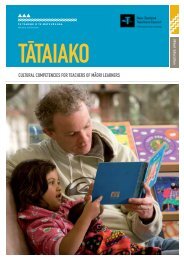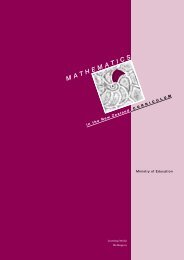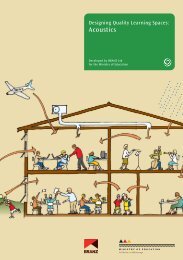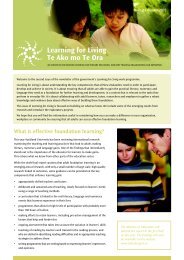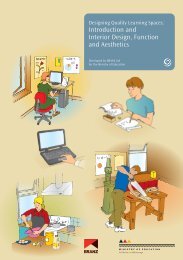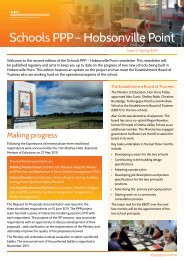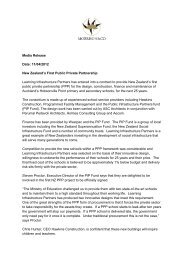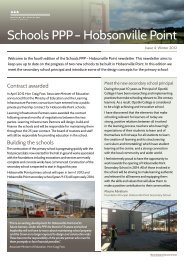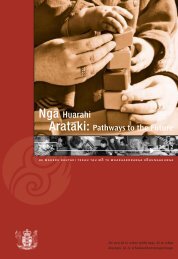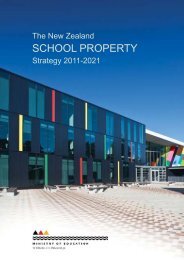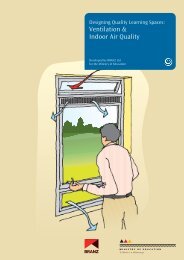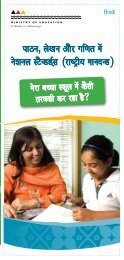values in the new zealand curriculum - Ministry of Education
values in the new zealand curriculum - Ministry of Education
values in the new zealand curriculum - Ministry of Education
Create successful ePaper yourself
Turn your PDF publications into a flip-book with our unique Google optimized e-Paper software.
<strong>the</strong>se are expressed depends on <strong>the</strong> ethnic identity <strong>of</strong> parents, family and<br />
community, and <strong>the</strong> degree to which this ethnic identity has been <strong>in</strong>stilled <strong>in</strong> <strong>the</strong>ir<br />
children (Anae, 2001, p. 112).<br />
Learn<strong>in</strong>g, culture and <strong>values</strong><br />
The middle class nature <strong>of</strong> <strong>the</strong> <strong>values</strong>, attitudes and expectations <strong>of</strong> <strong>the</strong> school<strong>in</strong>g systems<br />
<strong>in</strong> most Western countries is well documented. The challenge for m<strong>in</strong>ority ethnic groups is<br />
how to succeed when a mismatch exists between <strong>the</strong> <strong>values</strong> and priorities <strong>of</strong> <strong>the</strong> home<br />
and those <strong>of</strong> <strong>the</strong> school. Research f<strong>in</strong>d<strong>in</strong>gs are variable about how successfully ethnic<br />
m<strong>in</strong>ority groups can compete and achieve <strong>in</strong> <strong>the</strong> light <strong>of</strong> such obstacles. The social<br />
reproduction role <strong>of</strong> schools is also prom<strong>in</strong>ent <strong>in</strong> <strong>the</strong> literature on school achievement and<br />
academic success. In o<strong>the</strong>r words, schools efficiently reproduce <strong>the</strong> <strong>in</strong>equalities <strong>in</strong> society<br />
ra<strong>the</strong>r than change <strong>the</strong>m, although that process does not occur <strong>in</strong> a smooth and<br />
uncontested manner (Mara, 1998).<br />
The learn<strong>in</strong>g culture <strong>of</strong> schools, <strong>the</strong> k<strong>in</strong>ds <strong>of</strong> knowledge and ways <strong>of</strong> organis<strong>in</strong>g and<br />
mak<strong>in</strong>g knowledge accessible and contestable, will communicate what is valued (content)<br />
and how <strong>values</strong> are communicated (whole school atmosphere, <strong>the</strong> politics <strong>of</strong> school power<br />
structures, access to resources and extra-curricula supports, favoured pedagogy and<br />
levels <strong>of</strong> community <strong>in</strong>volvement). On one level what is valued at school will be<br />
communicated by <strong>the</strong> emphasis that schools put on certa<strong>in</strong> mission <strong>values</strong> and goals,<br />
certa<strong>in</strong> subjects, and <strong>of</strong> course, <strong>the</strong> outputs <strong>of</strong> learn<strong>in</strong>g. (It is at this level that <strong>values</strong> as<br />
ideals about education can be explicitly discerned). On ano<strong>the</strong>r level, school <strong>values</strong> will be<br />
communicated by how schools engage with learners. Here, <strong>values</strong> <strong>in</strong>fuse <strong>the</strong> <strong>of</strong>ficial and<br />
daily function<strong>in</strong>g <strong>of</strong> schools, and as Mara’s summary makes clear, <strong>of</strong>ten <strong>the</strong>re is a<br />
mismatch between home and school <strong>values</strong> for ethnic m<strong>in</strong>orities. Pr<strong>of</strong>essor Konai<br />
Thaman (1998), a Tongan, provides an example <strong>of</strong> how <strong>values</strong> are both ideals and<br />
material to <strong>the</strong> way cultures (<strong>in</strong>clud<strong>in</strong>g those <strong>of</strong> schools) are experienced.<br />
I def<strong>in</strong>e culture as <strong>the</strong> way <strong>of</strong> life <strong>of</strong> a discrete group, which <strong>in</strong>cludes a language, a<br />
body <strong>of</strong> accumulated knowledge, skills, beliefs and <strong>values</strong>. I see culture as central<br />
to <strong>the</strong> understand<strong>in</strong>g <strong>of</strong> human relationships and acknowledge <strong>the</strong> fact that<br />
members <strong>of</strong> different cultural groups have unique systems <strong>of</strong> perceiv<strong>in</strong>g and<br />
organis<strong>in</strong>g <strong>the</strong> world around <strong>the</strong>m. I also believe that <strong>the</strong> ways <strong>in</strong> which we have<br />
Values <strong>in</strong> <strong>the</strong> New Zealand Curriculum: A Literature Review 39



